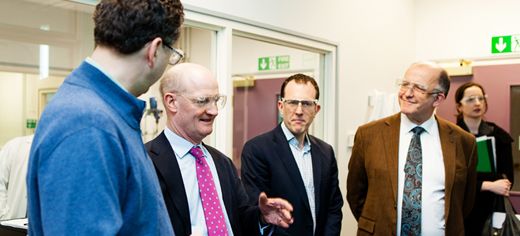
State-of-the-art facilities for chemistry and chemical engineering at the University of Leeds were showcased this week during a visit by the Minister for Universities and Science.
The Rt Hon David Willetts MP was given a tour of the Institute of Process Research and Development (iPRD), which aims to bridge the gap between academic research and its application in the chemical and pharmaceutical industries.
The Institute’s 650 m2 process development laboratory is the first of its kind in the UK and provides a unique set of facilities for research, contract work and postgraduate training.
It includes custom-built equipment for continuous processing, batch reactors for scaling up bench-top processes, and equipment to test for hazards and monitor the quality of products being developed. During the tour, the Minister was shown state-of-the-art continuous processing equipment as well as a batch reactor that was recently donated to the University by a major pharmaceutical company to replicate processing used by industry.
These will allow academics to work at industrially-relevant scales in developing the next generation of drugs and provide postgraduate students with the skills and experience of working with equipment they may encounter in their future careers.
Universities and Science Minister David Willetts said: “We have an excellent science and research base in the UK, but we need to connect this scientific expertise with commercial applications. It is great to see a facility such as this one here at Leeds which is bridging that gap and bringing the benefits of fundamental research to the pharmaceutical and chemical industries.”

Professor John Blacker, Technical Director of iPRD, said: “Researchers at iPRD are helping companies test and develop new processes, working with kilogram samples rather than just a few grams. We are resolving issues with product quality and improving the sustainability of processes by reducing the amount of waste produced and minimising energy usage. These are real-world problems faced by companies of all sizes that are being solved here in a university laboratory.”
Professor Kevin Roberts, Professor of Chemical Engineering, said: “Chemists don’t normally get to go beyond using test tubes and conical flasks in fume cupboards, but the unique facilities here at Leeds allow researchers to work at the same kind of standards they may go onto use in a career in the pharmaceutical industry.
It is furthering our engagement with businesses in the industrial heartlands of the North of England helping them to improve chemical process development and design.”
Professor Frans Muller, co-Programme Director for iPRD’s postgraduate teaching, said: “The team at iPRD has over fifty year’s combined experience of working in the fine chemical and pharmaceutical sectors. Students on our courses know that they are learning from industrially-experienced academics and that they will leave equipped with the skills needed for highly-sought after jobs in process R&D and manufacturing.” iPRD is an interdisciplinary institute that links the School of Chemistry and School of Process, Environmental and Materials Engineering (SPEME).
More details about the institute’s facilities, industrial club and opportunities for postgraduate study can be found at http://www.iprd.leeds.ac.uk/. iPRD receives support from the Department of Business Innovation and Skills (BIS) and the European Union through its European Regional Development Fund (ERDF) programme administered by the Department for Communities and Local Government (DCLG).
For further information:
Please contact the University of Leeds Press Office on +44 (0)113 343 4031 or email pressoffice@leeds.ac.uk
For enquiries about iPRD contact:
Professor John Blacker, iPRD Technical Director. Tel: +44 (0)113 343 8239; email j.blacker@leeds.ac.uk